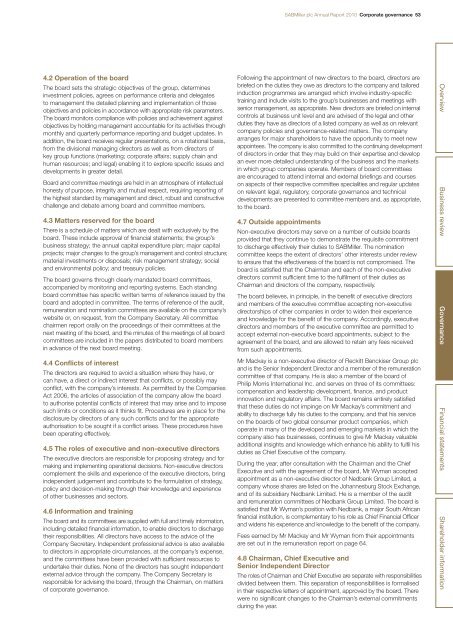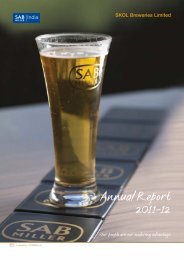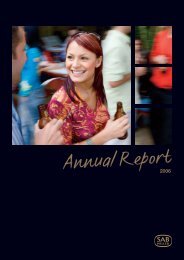Annual Report - SABMiller
Annual Report - SABMiller
Annual Report - SABMiller
- No tags were found...
You also want an ePaper? Increase the reach of your titles
YUMPU automatically turns print PDFs into web optimized ePapers that Google loves.
<strong>SABMiller</strong> plc <strong>Annual</strong> <strong>Report</strong> 2010 Corporate governance 534.2 Operation of the boardThe board sets the strategic objectives of the group, determinesinvestment policies, agrees on performance criteria and delegatesto management the detailed planning and implementation of thoseobjectives and policies in accordance with appropriate risk parameters.The board monitors compliance with policies and achievement againstobjectives by holding management accountable for its activities throughmonthly and quarterly performance reporting and budget updates. Inaddition, the board receives regular presentations, on a rotational basis,from the divisional managing directors as well as from directors ofkey group functions (marketing; corporate affairs; supply chain andhuman resources; and legal) enabling it to explore specific issues anddevelopments in greater detail.Board and committee meetings are held in an atmosphere of intellectualhonesty of purpose, integrity and mutual respect, requiring reporting ofthe highest standard by management and direct, robust and constructivechallenge and debate among board and committee members.4.3 Matters reserved for the boardThere is a schedule of matters which are dealt with exclusively by theboard. These include approval of financial statements; the group’sbusiness strategy; the annual capital expenditure plan; major capitalprojects; major changes to the group’s management and control structure;material investments or disposals; risk management strategy; socialand environmental policy; and treasury policies.The board governs through clearly mandated board committees,accompanied by monitoring and reporting systems. Each standingboard committee has specific written terms of reference issued by theboard and adopted in committee. The terms of reference of the audit,remuneration and nomination committees are available on the company’swebsite or, on request, from the Company Secretary. All committeechairmen report orally on the proceedings of their committees at thenext meeting of the board, and the minutes of the meetings of all boardcommittees are included in the papers distributed to board membersin advance of the next board meeting.4.4 Conflicts of interestThe directors are required to avoid a situation where they have, orcan have, a direct or indirect interest that conflicts, or possibly mayconflict, with the company’s interests. As permitted by the CompaniesAct 2006, the articles of association of the company allow the boardto authorise potential conflicts of interest that may arise and to imposesuch limits or conditions as it thinks fit. Procedures are in place for thedisclosure by directors of any such conflicts and for the appropriateauthorisation to be sought if a conflict arises. These procedures havebeen operating effectively.4.5 The roles of executive and non-executive directorsThe executive directors are responsible for proposing strategy and formaking and implementing operational decisions. Non-executive directorscomplement the skills and experience of the executive directors, bringindependent judgement and contribute to the formulation of strategy,policy and decision-making through their knowledge and experienceof other businesses and sectors.4.6 Information and trainingThe board and its committees are supplied with full and timely information,including detailed financial information, to enable directors to dischargetheir responsibilities. All directors have access to the advice of theCompany Secretary. Independent professional advice is also availableto directors in appropriate circumstances, at the company’s expense,and the committees have been provided with sufficient resources toundertake their duties. None of the directors has sought independentexternal advice through the company. The Company Secretary isresponsible for advising the board, through the Chairman, on mattersof corporate governance.Following the appointment of new directors to the board, directors arebriefed on the duties they owe as directors to the company and tailoredinduction programmes are arranged which involve industry-specifictraining and include visits to the group’s businesses and meetings withsenior management, as appropriate. New directors are briefed on internalcontrols at business unit level and are advised of the legal and otherduties they have as directors of a listed company as well as on relevantcompany policies and governance-related matters. The companyarranges for major shareholders to have the opportunity to meet newappointees. The company is also committed to the continuing developmentof directors in order that they may build on their expertise and developan ever more detailed understanding of the business and the marketsin which group companies operate. Members of board committeesare encouraged to attend internal and external briefings and courseson aspects of their respective committee specialities and regular updateson relevant legal, regulatory, corporate governance and technicaldevelopments are presented to committee members and, as appropriate,to the board.4.7 Outside appointmentsNon-executive directors may serve on a number of outside boardsprovided that they continue to demonstrate the requisite commitmentto discharge effectively their duties to <strong>SABMiller</strong>. The nominationcommittee keeps the extent of directors’ other interests under reviewto ensure that the effectiveness of the board is not compromised. Theboard is satisfied that the Chairman and each of the non-executivedirectors commit sufficient time to the fulfilment of their duties asChairman and directors of the company, respectively.The board believes, in principle, in the benefit of executive directorsand members of the executive committee accepting non-executivedirectorships of other companies in order to widen their experienceand knowledge for the benefit of the company. Accordingly, executivedirectors and members of the executive committee are permitted toaccept external non-executive board appointments, subject to theagreement of the board, and are allowed to retain any fees receivedfrom such appointments.Mr Mackay is a non-executive director of Reckitt Benckiser Group plcand is the Senior Independent Director and a member of the remunerationcommittee of that company. He is also a member of the board ofPhilip Morris International Inc. and serves on three of its committees:compensation and leadership development, finance, and productinnovation and regulatory affairs. The board remains entirely satisfiedthat these duties do not impinge on Mr Mackay’s commitment andability to discharge fully his duties to the company, and that his serviceon the boards of two global consumer product companies, whichoperate in many of the developed and emerging markets in which thecompany also has businesses, continues to give Mr Mackay valuableadditional insights and knowledge which enhance his ability to fulfil hisduties as Chief Executive of the company.During the year, after consultation with the Chairman and the ChiefExecutive and with the agreement of the board, Mr Wyman acceptedappointment as a non-executive director of Nedbank Group Limited, acompany whose shares are listed on the Johannesburg Stock Exchange,and of its subsidiary Nedbank Limited. He is a member of the auditand remuneration committees of Nedbank Group Limited. The board issatisfied that Mr Wyman’s position with Nedbank, a major South Africanfinancial institution, is complementary to his role as Chief Financial Officerand widens his experience and knowledge to the benefit of the company.Fees earned by Mr Mackay and Mr Wyman from their appointmentsare set out in the remuneration report on page 64.4.8 Chairman, Chief Executive andSenior Independent DirectorThe roles of Chairman and Chief Executive are separate with responsibilitiesdivided between them. This separation of responsibilities is formalisedin their respective letters of appointment, approved by the board. Therewere no significant changes to the Chairman’s external commitmentsduring the year.Overview Business review Governance Financial statements Shareholder information













